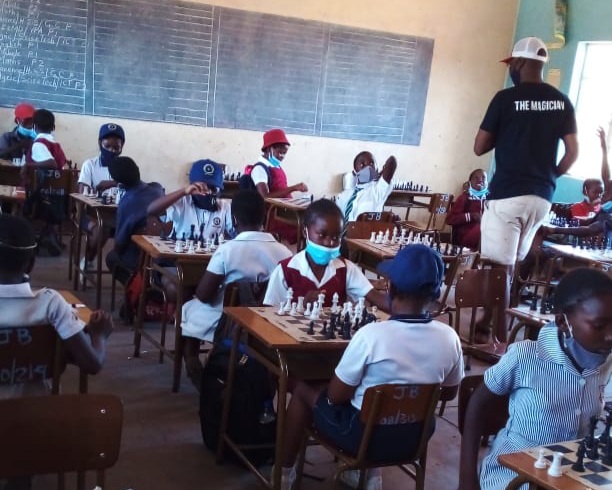BY FARAI SHAWN MATIASHE
Under partly cloudy skies, Lydia Mlilo, 56, fetches water from a communal tap in the sparsely populated village of Singeni.
Any clouds are unusual in winter in this semi-arid land with nothing but teak forests, and to Mlilo they are not a sign of rain.
The water in this Nkayi district village in Matebeleland North province, 168km northeast of Zimbabwe’s second-largest city of Bulawayo, is pumped from underground using solar energy and stored in huge tanks.
It is then carried by pipeline in the village, supplying water to villagers as well as a nearby school.
Mlilo uses this water for all her domestic needs.
The mother of six still recalls the predicament of not having clean and safe water in the 2000s and early 2010s.
“It used to rain [so] that I could get water in the wells at my household, but that changed almost two decades back,” Mlilo said.
“The water tables are now so low that we cannot even access water. We used to get water at about 12m, but now maybe at more than 50m.
“I had to fetch water from open wells on the shores of a nearby river.
“It was dirty but we had no choice, we had to drink it. We could, however, get stranded in summer when the river runs dry.”
German charity Welthungerhilfe installed solar stations in Mlilo’s village and the village of Ngabayide as part of its Matabeleland Enhanced Livelihoods Agriculture and Nutrition Adaptation (Melana) project, which is running in four districts in Matabeleland.
The project started in 2016 and ends in 2022, and is part of the wider Zimbabwe Resilience Building Fund (ZRBF) programme.
These water sources benefit more than 350 households, as well as the owners of more than 4 000 head of cattle, who use them for drinking water and to dip their livestock, according to ZRBF-Melana project head Kudzai Nyengerai.
Singeni village head Nathaniel Ncube (66), says there were outbreaks of waterborne diseases such as cholera and typhoid in the village in the early 2010s.
“Most of the households do not have toilets. Open defecation is common here,” Ncube said.
“With water being a menace in the village, we lost a number of our villagers from the outbreak of diseases.”
Mlilo is a smallholder who grows drought-resilient crops such as millet and sorghum.
She also rears cattle and has 10 that she dips at a community dip tank. They drink water there, too.
Villagers in Nkayi district are limited in terms of how they can earn a living because climate change has made agriculture unviable.
Some survive on remittances from the diaspora, as family members were forced to cross the border to neighbouring South Africa or Botswana to search for work during Zimbabwe’s economic crisis in the mid to late 2000s.
The roads are rugged and the villages difficult to access.
There is a lack of infrastructure such as electricity, internet, television and radio signals.
Rachel Dube (29), from Singeni village, says she did not believe it was possible for a community deep in the thick forests to have a tap.
“I thought tap water was only for people in the cities,” Dube said.
“ I did not know it was possible for us. This solar technology has done wonders.”
The mother of three says she can now practise the maximum levels of hygiene recommended by nurses when looking after her children.
Nyengerai said the solar stations ensure that villagers have a perennial source of water.
“The two communities in question here have since established nutrition gardens. Even the nearby schools have benefitted by establishing their own gardens, and issues like livestock poverty deaths and time poverty have been reduced.”
Sukokuhle Khabo, 30, from Indibe village in Gwanda, is among the 2 100 households that benefit from the solar-powered irrigation schemes in this district in Matabeleland South province.
“I am growing onions, tomatoes and carrots for family consumption as well as for sale in Gwanda town and Bulawayo. We have been using the flash irrigation method to water the garden but we have since changed to drip irrigation, which saves water,” she says.
The mother of three says she uses the proceeds from her garden to buy other essentials for her family and pay her children’s school fees.
Like Nkayi, the Gwanda district is semi-arid and poorly developed.
“Drip irrigation has less labour and is critical in conserving water,” says smallholder Musa Moyo (75) from Indibe.
“Drip irrigation uses less water on a large piece of land. We rotate our crops [and use] mulch to conserve the much-needed water.”
Melody Makumbe is the project coordinator for Resilience Enhanced through Agricultural Productivity, run by development agency Practical Action.
“We use green energy to pump water as [opposed] to dirty fuels,” Makumbe said.
“ We facilitate access to markets, increasing access to finance, rehabilitation and support with infrastructure for irrigation as well as capacity-building for management structures of the irrigation schemes.”
In Nkayi, residents have established asset management committees that oversee any operational or maintenance issues with the solar stations.
Nyengerai says villagers have set up a revolving fund to pay for any issues that arise with the equipment.
“Singeni village went on to have fundraising initiatives that fund the maintenance of the scheme, for instance, cattle sales.
“These two projects have been run by the community since 2018 without any problem,” she added.
Mlilo hopes the initiative will expand to support other schools nearby.“Some schools in this village do not have clean and safe water,” she said.
“We are not yet safe from outbreaks if some nearby places such as schools have no water.” – New Frame
This story was published with the support of the British Council as part of COP26, the United Nations Climate Change Conference in Glasgow, Scotland.

 Slider1 year ago
Slider1 year ago
 News1 year ago
News1 year ago
 Tourism and Environment2 years ago
Tourism and Environment2 years ago
 News2 years ago
News2 years ago
 News2 years ago
News2 years ago
 News1 year ago
News1 year ago
 News1 year ago
News1 year ago
 Slider1 year ago
Slider1 year ago




robot forex en francais
December 24, 2021 at 11:12 am
Hi there, You’ve done an incredible job. I will certainly digg it
and personally recommend to my friends. I am sure they’ll be benefited from
this site.
sex toys review compare
December 30, 2021 at 6:39 pm
I was very happy to uncover this page. I need to to thank you for ones time due to this
wonderful read!! I definitely really liked every little bit of it and
I have you bookmarked to see new stuff on your blog.
rub and tub free porno video clip
January 8, 2022 at 2:57 am
Incredible story there. What happened after?
Good luck!
binary options pro signals performance bicycle
January 11, 2022 at 6:45 am
I know this if off topic but I’m looking into starting my own blog and was wondering what all is required to
get set up? I’m assuming having a blog like yours would cost a pretty penny?
I’m not very web smart so I’m not 100% certain. Any tips or advice would be greatly appreciated.
Thanks
top forex robot software
January 14, 2022 at 5:31 am
It’s an remarkable post in support of all the internet users; they will
get advantage from it I am sure.
free forex robot automation
January 18, 2022 at 12:53 pm
Thanks for finally writing about > In perched rural Matabeleland North, renewable energy is vital – VicFallsLive < Loved it!
best forex robot test
January 20, 2022 at 12:37 am
you’re actually a good webmaster. The web site loading velocity
is amazing. It kind of feels that you are doing any distinctive trick.
Also, The contents are masterpiece. you have done a
magnificent job on this matter!
خبراء الخيارات الثنائية
January 25, 2022 at 2:29 am
magnificent publish, very informative. I’m wondering why the other specialists of this sector don’t notice this.
You must continue your writing. I’m confident, you have a
great readers’ base already!
gps forex robot 2020
January 26, 2022 at 3:41 pm
We’re a bunch of volunteers and opening a new scheme in our community.
Your site provided us with useful info to work on. You’ve done a formidable task
and our whole group might be grateful to you.
what is forex robot
February 2, 2022 at 11:53 pm
Hey! Someone in my Myspace group shared this site with us so I
came to check it out. I’m definitely loving the information. I’m
book-marking and will be tweeting this to my followers!
Great blog and superb design.
Wayne Rat Control
July 21, 2022 at 8:05 pm
Nice post . Thank you for posting something like this.